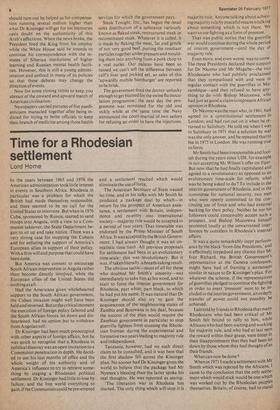Time for a Rhodesian settlement
Lord Home
In the years between 1965 and 1976 the American administration took little interest in events in Southern Africa. Rhodesia in particular was a problem for which the British had made themselves responsible, and there seemed to be no call for the United States to intervene. But when in 1976 Cuba, sponsored by Russia, started to send troops into Angola, with a view to a Communist takeover, the StateDepartment began to sit up and take notice. There was a very strong case for stopping the Cubans and for enlisting the support of America's European allies in support of their policy. With a firm will and purpose that could have been done.
But America was content to encourage South African intervention in Angola rather than become directly invojved, while the European allies of the United States did nothing at all.
Had the Americans given wholehearted support to the South African government, the Cuban invasion might well have been held and reversed. But at the critical moment the execution of foreign policy faltered and the South African forces, let down and disheartened, had no option but to withdraw from Angolan soil.
Dr Kissinger had been much preoccupied with other aspects of foreign affairs, but he was quick to recognise that a Rhodesia in political disarray was an open invitation to a Communist penetration in depth. He decided to use his last months of office and the whole weight of his authority and of America's influence to try to retrieve something by staging a Rhodesian political settlement. Dr Kissinger had little to lose by failure, and the free world everything to gain, if the Communists could be pre-empted and a settlement reached which would eliminate the use of force.
The American Secretary of State wasted no time, and in his talks with Mr Smith he produced a package deal by which—in return for the prospect of American assistance, a settlement with Britain, independence and re-entry into international society—majority rule would be accepted in a period of two years. That timetable was endorsed by the Prime Minister of South Africa. It was accepted by the British Government. I had always thought it was an unrealistic time limit. All previous proposals for settlement had been in an evolutionary time-scale: this was revolutionary. But it was, if taken literally, a breath-taking result.
The obvious tactic—most of all for those who doubted Mr Smith's sincerity—was immediately to take him at his word, and to start to form the interim government for Rhodesia, part white, part black, to which he had put his name. It was natural that Dr Kissinger should also try to gain the acquiescence of the neighbouring states of Zambia and Botswana in his deal, because the success of the plan would require the Zambian government in particular to stop guerrilla fighters from crossing the Rhodesian frontier during the experimental and formative two years leading to majority rule and independence.
Tanzania, however, had no such direct claim to be consulted, and it was here that the first shadow fell across the Kissinger plan. No sooner had Dr Kissinger given the world to believe that the package had Mr Nyerere's blessing than the latter spoke his real thoughts. He was reported as saying: 'The liberation war in Rhodesia has started. The only thing which will stop it is majority rule. Anyone talking about achieving majority rule by peaceful means is talking about something which is not there. We want to use fighting as a form of pressure.'
That was public notice that the guerrilla war would continue during the whole period of interim government—until the day of majority rule.
Even more, and even worse, was to come. The three Presidents declared their support for Dr Nkomo and Mr Mugabe—the two Rhodesians who had publicly proclaimed that they sympathised with and were in regular contact with the guerrillas in Mozambique—and they refused to have anything to do with Bishop Muzorewa, who had just as good a claim to represent African opinion in Rhodesia.
Dr Nkomo was the man who, in 1961, had agreed to a constitutional settlement in London, and had run out on it when he returned to Salisbury. He told me when I was in Salisbury in 1971 that a solution by war was the only answer, and he repeated that to 'me in 1975 in London. He was running true to form.
MrSmith had been irresponsible and foolish during the years since UDI, for example in not accepting Mr Wilson's offer on Tiger. But now that he had finally capitulated and agreed to a revolutionary as opposed to an evolutionary time-scale for reform, what was he being asked to do? To include in the interim government of Rhodesia, and in the committee for national security, two men who were openly committed to the continuing use of force and who had external backing for their policy. Neither he nor his followers could conceivably accept such a prospect, and Bishop Muzorewa himself protested loudly at the unwarranted interference by outsiders in Rhodesia's internal affairs.
It was a quite remarkably inept performance by the black 'front-line Presidents, and it effectively torpedoed any chance that Mr Ivor Richard, the British Government's representative at the Geneva conference, might have had of framing a settlement similar in nature to Dr Kissinger's plan. For whatever the scheme, if the representatives of guerrillas pledged to continue the fighting in order to exert 'pressure' were to be included in the interim government, an orderly transfer of power could not possibly be achieved.
lam told by friends in Rhodesia that many Rhodesians who had been critical of Mr Smith felt bound to rally to him, while Africans who had been waiting and working for majority rule, and who had at last seen the reward within their grasp, were bitter in their disappointment that they had been let down by those whom they had thought of as their friends.
What can now be done ?
When in 1971 Imadeasettlementwith Mr Smith which was rejected by the Africans, I came to the conclusion that the only settlement which would stick would be one which was worked out by the Rhodesian peoples themselves. Britain, of course, had to stand by to help with advice if asked, because at the end of the day it was Britain alone who could achieve the lifting of sanctions— contrive the return of Rhodesia to a legal relationship with the Crown, and restore her to her status in the international community. Others, however, should not be put in a Position to veto a settlement which is negotiated by the Rhodesians themselves.
The probability of a negotiated arrangement has been compromised by the collapse of the Kissinger enterprise, but there are two factors in the present Rhodesian scenario from which agreement could derive.
The first is that Mr Smith has not repudiated his statement that he would agree to majority rule in two years provided that the transition was orderly. He has in fact lately repeated the pledge. The second is that Bishop Muzorewa is a Rhodesian, is in Rhodesia, and wishes to reach a settlement Without the use of force. The lesson of the recent months would seem to be that out siders should lay off and allow the different groups inside Rhodesia to work out a reconciliation.
The indications are that the new administration of President Carter will not embark on a new initiative. Mr Young, the American representative at the United Nations, has already concluded that nothing can happen in a hurry. But the regime seem to set a high Priority on helping developing countries and there will certainly be a need for investment for industry and agriculture and funds for education when the new multiracial state arrives. Then America could usefully come in.
The Rhodesians too—black and white— should recognise, if they are wise, that they have no time to lose. Apart from the fact that conscription of the adult male population is placing a great strain on the economy, there are weightier reasons for Rhodesians to sink their differences and to come to an agreement in the short breathing space which is available.
The opportunity stems from the fact that the Cubans are having a rough time in Angola at the hands of UNITA, while even With the help of Russian advisers, the guerrillas in Mozambique are slow to acquire the military skills which are needed to deal with trained soldiers.
For the moment the Russian leaders are Probably hesitating as to how far to push their luck and to extend their commitment. But one thing is certain : so long as black and White Rhodesians fail to reach agreement on
their future, so long will Russia persevere in interference. The longer they are given the greater will the guerrilla threat become.
There is every incentive, then, for Africans and Europeans to recognise that they are all in the same boat, and that if they fail to agree, all of them—black and white—will be swamped by an alien political creed. Let them get down to the business of building one nation as the basis for the independence and international status for which they crave, and which is so vital for the future Wellbeing of all of them.



































 Previous page
Previous page